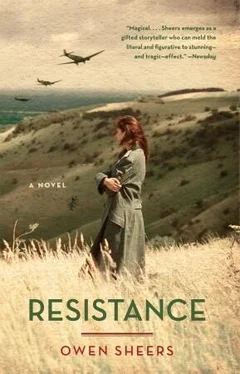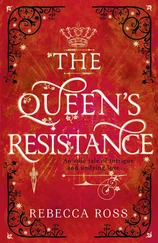
By the time Albrecht and Alex reached Upper Blaen Sarah had already stoked the fire and fed it with fresh wood and coal.
“Put ’em there,” she said, pushing the table back to make room in front of the range. Alex laid one of the ewes on the flagstones as gently as if he was putting a child to bed, then took the other from off Albrecht’s back and laid it beside it. The two of them lay there, still numb and listless with cold. Alex said something in German to Albrecht.
“A cloth? A towel?” Albrecht said.
Sarah went into the porch and got an old flannel shirt Tom used for wrapping weak lambs in and gave it to Alex. Undoing his scarf and taking off his gloves, the big German sat down beside the sheep and began rubbing their necks and backs. A pool of water was already bleeding from under them as their frozen coats began to thaw.
“He’s good with ’em,” Sarah said, not looking at Albrecht. “Knows what he’s doing.”
“Alex grew up on a farm,” Albrecht said. On entering the kitchen his glasses had misted and now he was cleaning them on a corner of his shirt.
Sarah sat down. Here they were again. In her house, in the kitchen. The enemy. The invading army. But it was different this time. As if the snow had shed them all of their history. She felt safe. For the first time in over a month, she felt safe.
“You’re still here,” she said, looking up at Albrecht.
“I’m sorry?”
“You’re still here,” she said again, looking at the red marks where his glasses had pressed over the bridge of his nose. “In the valley. You said two weeks before.”
Albrecht glanced at Alex rubbing at the sheep with the old flannel shirt. He didn’t understand English. “Yes,” Albrecht said. “A dispatch rider came. We’re to stay for a little longer.”
“How much?”
Albrecht tried to smile but his face felt stiff and immobile with the cold. “I’m afraid I can’t tell you that, Mrs. Lewis.”
Sarah looked back down at the sheep. “I should heat ’em some water.” She got up, collected a tin bucket from behind the door, and went out into the yard. When she came back in the bucket was half-filled with snow and her hair was shot with flakes. Albrecht was at the dresser, one hand holding the cover of the family Bible, the other turning its thin pages.
“Pump’s frozen,” Sarah said, walking past him and hanging the bucket on a hook above the range.
She sat down again and for a while none of them spoke. The only sounds were the falling of the coal in the grate, the hissing of the damp bucket above the fire, the wind at the window, and Alex, murmuring to the sheep in German.
“It was Alex’s idea we came to help,” Albrecht said eventually. “When he saw the snow. He said you might need help.”
Sarah looked out the window at the obscured world. He knew then. They all knew. Of course they did. You might need help . He may as well have just said it straight out. Because your husband isn’t here. Because your husband has gone. Sarah felt a trickle of fear run under her heart, like the returning voice of an old friend.
“My patrol have gone to the other farms too,” Albrecht continued. “To help.”
Sarah thought how that must have been. The German soldiers wading over the fields. Knocking at the doors, peering through windows. What would the others have done? What had Maggie done? Were the Germans standing in their kitchens now? Somehow she thought not.
“D’they speak English too?” she asked.
“No,” Albrecht said, “but I told them what to say. And I gave them notes.”
Sarah nodded slowly. Menna couldn’t read.
One of the ewes shifted its legs, dragging a hoof over the stone.
“Where d’you learn yours?” Sarah said, looking back at Albrecht.
“I lived here. Before the war. I was a student in Oxford and then in London.”
Now it was Albrecht’s turn to look away through the white window.
“You went to Oxford? The university?” Sarah said.
Albrecht turned back to her. “Yes. For a year.” He was surprised by her question, by the knowledge it implied. He closed the Bible and leant against the dresser. “Did you go to school, Mrs. Lewis?”
“Only ’til fourteen,” Sarah said, glancing at a framed certificate on the wall. “Then I had t’work.”
Albrecht went over to the certificate and looked it over. It was faded but had been as lovingly framed and hung as an old master. He read from its typed print:
Herefordshire County Council Education Committee
ON LEAVING SCHOOL
Dear Sarah
FOURTEEN YEARS OF AGE — You have now passed your fourteenth birthday. It may be your intention to leave School, or you may have resolved to continue your studies for a time. In either case, here is a message of friendly counsel and good cheer.
Great issues depend on this period in your life. Choices are being made now by which the course of your life for good or ill, for success or failure, is determined.
There followed a number of sections, each bearing a paragraph of advice. Albrecht cast his eye between them, the sound of the wind rising hollow in the chimney behind him.
THE GREAT CHOICE — The greatest of all choices is that between good and evil; whatever else you may be or do, strive to be good. Speak the truth always, whatever it cost you. Be courteous to everybody; to honour another is to honour yourself. Keep your temper. There is no harm in having a temper; the harm lies in losing it.
YOUR CHARACTER — Your most precious possession is a pure character. Guard it closely. It is easily lost; it is terribly hard to regain.
YOUR BODY — By fresh air, by cleanliness, by recreation, by regular habits, keep your body fit. Be temperate in all things. Beware of strong drink. Athletes in training abstain from alcohol, and surely it is our duty to be always at our fittest.
YOUR MIND — Good books are “Kings’ Treasure.” Read only the best. The best of all books is the Bible. Read it daily; get to know it thoroughly. The reading of a few verses every morning or evening is the best of all tonics for mind and soul.
NEVER BET OR GAMBLE — Gambling is an unhealthy striving to gain something without giving proper return for it. It is a great evil, destructive of character, disastrous in its consequences.
Albrecht didn’t read any more. He didn’t like this certificate. Its tone of “friendly counsel” was tinged for him by the miles of printed rhetoric he’d seen fed to the children of the Reich. Moral directives. Orders that, given and followed enough times, would lead to the arrogance of that Gestapo officer in Oxford; to other fourteen-year-olds taking up guns and spitting at Jews. But that wasn’t the only reason this certificate left a bad taste in his mouth. Standing there, in that farmhouse kitchen in another country, he couldn’t shake the sense that somehow its vacuous advice was intended for him too, both advising and admonishing him at once.
“Some good advice,” he said, turning away from the certificate and leaning against the edge of the dresser again. Sarah stood and fetched a wooden spoon to stir the melting snow in the bucket. Albrecht looked back at the certificate.
“May I ask you about these names, Mrs. Lewis?”
Sarah looked up at him, her eyes like the first night he’d seen her, fierce and fearful in her husband’s clothes.
“Richards and Thomas,” Albrecht continued, tapping at the two signed signatures in the bottom right-hand corner. “These family names are also Christian names. Richard and Thomas?”
Sarah went back to stirring the snow, nodding in reply.
“And yours too? Lewis? This can be a man’s Christian name?”
Читать дальше













